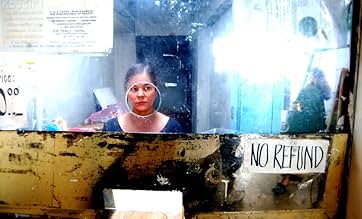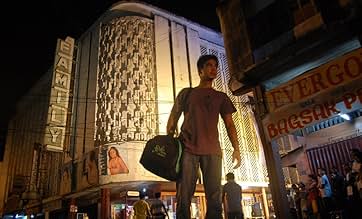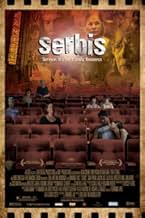VALUTAZIONE IMDb
6,1/10
2011
LA TUA VALUTAZIONE
Aggiungi una trama nella tua linguaThe Pineda family struggles with bigamy, unwanted pregnancy, possible incest, and skin irritations in a dilapidated movie theater.The Pineda family struggles with bigamy, unwanted pregnancy, possible incest, and skin irritations in a dilapidated movie theater.The Pineda family struggles with bigamy, unwanted pregnancy, possible incest, and skin irritations in a dilapidated movie theater.
- Regia
- Sceneggiatura
- Star
- Premi
- 9 vittorie e 15 candidature totali
Kristoffer King
- Ronald
- (as Kristofer King)
Dido de la Paz
- Atty. Quintana
- (as Dido Dela Paz)
Buddy Caramat
- Tonette
- (as Buddy Salvador Caramat)
Aaron Rivera
- Ricky
- (as Aaron Christian Rivera)
Recensioni in evidenza
I got very curious of Brillante Mendoza's work after his victory at Cannes for the film "Kinatay". I saw one of his films years before, "Masahista" (The Masseur) and I wasn't really a big fan. I just didn't care much for the style or the storytelling ability. The film was just doesn't show the promise or the makings of a great director. I've heard so much about "Serbis" and "Kinatay". Most of it strong reactions of how raw it is and the director himself was blatant to say that he intends to do the kind of films that you'll either hate or love. I choose to reserve judgment until I get to see both films. After seeing "Serbis", I have to say that Brillante Mendoza improved a lot from the time he made "Masahista". While the film is not outstandingly brilliant or groundbreaking, I definitely saw a lot of promise there. I get the lack of plot. It was intentional, it was meant to be a slice of life, a day in the life of a family in moral decadence. What I don't get is the lack of perspective and "voice". While the director seemingly takes the observation post and chooses to reserve judgment, the fact that you choose what to show in front of the audience is an obvious statement that you're condemning that "immorality" has become a normalcy in the lives of the Filipino people. I know another layer to it that everything is just a parallelism to the Philippine movie industry. I'm not criticizing the judgment but at least if you're going to say something, commit to it rather than putting it as an undertone. Take for example, the kid who took the extra change and lied about it. If the director just really wants to stay on the observation post and reserve judgment, then the camera has no business following the kid. By choosing to show it, you have obviously taken a stand. Not that I'm looking for a rationalization or a justification the cause for the degradation of morality of the whole family but if you're showing it as something wrong, I certainly wouldn't mind a progression on how the lack of morality would drive these people. Putting it on a plain field just makes the whole thing monotonous. I haven't had the chance to see "Kinatay" but from the reviews that I have read, it had the same problem. Brillante Mendoza has the eye and the promise to make it as a great director but if he keeps on serving the same thing and committing the same mistakes, then I wouldn't be surprised he'll soon be buried in the pile.
A dilapidated Filipino movie theater is the star of this film, but it's not a dark, haunted place like the cinema of Tsai Ming-liang's austere Goodbye, Dragon Inn. Located in the city of Angeles in the Philippines, this one, only partly ironically called "Family," is active, in fact overactive, and holes in walls leave it open to invasions from goats and its lower floor is exposed to the noises of a busy street crammed with pedestrians, motorcycles, cars, and trucks at all hours.
Serbis shows heterosexual porn movies all day long while numerous gay hustlers ply their trade for the pleasure of older gay men, performing fellatio or having it performed on them in the seats and in the back of the big auditorium. "Serbis" means "service" and is the rallying cry of the gay rent boys. The theater is run by the Pineda family, who come and go, they live upstairs, they run a fast food restaurant on the ground floor, and they deal with such personal problems as bigamy, unwanted pregnancy, possible incest, and a boil on an attractive young male bum. This film, which includes clips of the porno, live sex involving the family and the in-house prostitutes, is Mendoza's seventh feature film and was an official selection of the 2008 Festival de Cannes.
Events happen on a "Wednesday (the day for the novena to the Mother of Perpetual Help) in October (month-long feast of Our Lady of the Rosary)"--I'm quoting from the distributor's material. The rather regal Nanay Flor (Gina Pareno) has filed a bigamy case against her estranged husband Tatay Edwinand goes to court to see the years-long case finally decided. Alan (Coco Martin) is a young man upstairs who paints busty nudes on the wall; he's the one who has a boil on his bum. He has sex with his girlfriend Merly (Mercedes Cabral) and has just learned to his dismay that she is pregnant. Nayda (Jacky Jose), who mans the theater while Nanay For is at court, is married but drawn to her cousin Ronald, who is also in the building. She sees to having the right movie posters up, and argues with her husband, Lando, on the phone, because Mr. El Lobo, the soft drink distributor, has to be paid. Lando (Julio Diaz) mans the little restaurant, not always successfully; a young man cheats him out of 30 pesos and he can't get it back. There is another brother, Ronald (Kristopher King). There's also a little bespectacled schoolboy, Jonas, who's good in math. The things he sees! Nanay Flor says that they had three theaters, but have had to close the other two because they weren't making money, and this one is failing.
Nanay Flor loses the case, and to her disappointment her youngest son, Jerome (Dan Alvaro) testifies against her. She is further distressed to learn that the film rentals are going up. Serbis is replete with actual details of this kind, and even shows Alan delivering reels to a bus and picking up the new ones for the week.
Excitement happens when a purse-snatcher tries to take refuge in the theater but customers, the family, and cops all chase him. The lights go on exposing the many "serbis" boys 'in flagrante.' When the thief is caught the lights go down, the film resumes, and the "serbis" boys are back to work. At another point a small white goat has escaped into the theater and appears just below the screen. Another chase. To recover from her horrible day, Nanay Flor takes a bath in the shoddy bathroom (the Gent's is flooded), grooms herself and dresses in black, and goes down to the ticket window facing out, ready for anything.
After symbolically popping his boil, Alan has impulsively packed a bag and run away. way.
Carlo Tabije and Benjamin Padero deserve notice for their set designs (the field in which Mendoza got his start); Odyssey Flores' cinematography is rough at times, but effective. The processing gives the images too edgy a look at times. The lighting isn't bad, but there is way too much street noise, and those who argue the whole production is exploitive and crude aren't far off the mark, but the depiction of a family isn't without interest, though this has none of the poetry and mood of other films about the devolution of a place.
This is as if a Third World 'telenovela,' with X-rated sex added, was all crammed into a single comprehensive 90-minute episode. It's an impressive achievement, but a little bit indigestible. Mendoza's earlier film 'Foster Child' received an ovation at the previous Cannes festival. He has produced something sui generis this time and it would appear that there is life in the Filipino film industry.
Serbis shows heterosexual porn movies all day long while numerous gay hustlers ply their trade for the pleasure of older gay men, performing fellatio or having it performed on them in the seats and in the back of the big auditorium. "Serbis" means "service" and is the rallying cry of the gay rent boys. The theater is run by the Pineda family, who come and go, they live upstairs, they run a fast food restaurant on the ground floor, and they deal with such personal problems as bigamy, unwanted pregnancy, possible incest, and a boil on an attractive young male bum. This film, which includes clips of the porno, live sex involving the family and the in-house prostitutes, is Mendoza's seventh feature film and was an official selection of the 2008 Festival de Cannes.
Events happen on a "Wednesday (the day for the novena to the Mother of Perpetual Help) in October (month-long feast of Our Lady of the Rosary)"--I'm quoting from the distributor's material. The rather regal Nanay Flor (Gina Pareno) has filed a bigamy case against her estranged husband Tatay Edwinand goes to court to see the years-long case finally decided. Alan (Coco Martin) is a young man upstairs who paints busty nudes on the wall; he's the one who has a boil on his bum. He has sex with his girlfriend Merly (Mercedes Cabral) and has just learned to his dismay that she is pregnant. Nayda (Jacky Jose), who mans the theater while Nanay For is at court, is married but drawn to her cousin Ronald, who is also in the building. She sees to having the right movie posters up, and argues with her husband, Lando, on the phone, because Mr. El Lobo, the soft drink distributor, has to be paid. Lando (Julio Diaz) mans the little restaurant, not always successfully; a young man cheats him out of 30 pesos and he can't get it back. There is another brother, Ronald (Kristopher King). There's also a little bespectacled schoolboy, Jonas, who's good in math. The things he sees! Nanay Flor says that they had three theaters, but have had to close the other two because they weren't making money, and this one is failing.
Nanay Flor loses the case, and to her disappointment her youngest son, Jerome (Dan Alvaro) testifies against her. She is further distressed to learn that the film rentals are going up. Serbis is replete with actual details of this kind, and even shows Alan delivering reels to a bus and picking up the new ones for the week.
Excitement happens when a purse-snatcher tries to take refuge in the theater but customers, the family, and cops all chase him. The lights go on exposing the many "serbis" boys 'in flagrante.' When the thief is caught the lights go down, the film resumes, and the "serbis" boys are back to work. At another point a small white goat has escaped into the theater and appears just below the screen. Another chase. To recover from her horrible day, Nanay Flor takes a bath in the shoddy bathroom (the Gent's is flooded), grooms herself and dresses in black, and goes down to the ticket window facing out, ready for anything.
After symbolically popping his boil, Alan has impulsively packed a bag and run away. way.
Carlo Tabije and Benjamin Padero deserve notice for their set designs (the field in which Mendoza got his start); Odyssey Flores' cinematography is rough at times, but effective. The processing gives the images too edgy a look at times. The lighting isn't bad, but there is way too much street noise, and those who argue the whole production is exploitive and crude aren't far off the mark, but the depiction of a family isn't without interest, though this has none of the poetry and mood of other films about the devolution of a place.
This is as if a Third World 'telenovela,' with X-rated sex added, was all crammed into a single comprehensive 90-minute episode. It's an impressive achievement, but a little bit indigestible. Mendoza's earlier film 'Foster Child' received an ovation at the previous Cannes festival. He has produced something sui generis this time and it would appear that there is life in the Filipino film industry.
Even before watching our very own semi-controversial finalist in the Cannes de Festival this year, I knew that I would love Brillante Mendoza's "Serbis." Not only because two of my friends are in the production team, but this film strikes a familiar chord in my heart because I know personally the venue and the local color of the story where the story of the film takes place. I grew up in Pampanga and saw many films in majority of the theaters in Pampanga. During the lahar era, my sister and I stayed and lived in our photography studio, which was just beside San Fernando's best theater then. That time, I was inside that theater almost every day, watching the same film of the week again and again. If that does not conjure much bias for this film, maybe this one will: I personally experienced being almost sexually harassed in the Family Theater, the very same one featured in the film "Serbis." Now that's enough neo-realism for you. Hahaha!
I can understand why many people dislike "Serbis"--it's too raw, uninhibited, and bleak. Foreigners would be turned off by the disgusting display of sexual scenes and the popping of the boil from an actor's buttocks and the deafening and unrefined sound quality. And Filipinos would also be repulsed by the "lack of story" and the absence of subtitles while the actors freely converse in Kapampangan and Ilocano.
I am lucky enough to have an Ilocano beside me in the theater, translating the Ilocano dialogue. Of course, I was delighted to hear Kapampangan being spoken so lavishly and frequently in the entire course of the story. It felt so much like home to me. The sound and sight of Pampanga in the film are startlingly genuine. I shivered at the sight of familiar places. I marveled at the uncanny natural feel of the setting. The theater is alive.
We witness how the camera leads us to follow the main characters, as it snakes in and out of every room and shamelessly presents to us its ugliness and grittiness. The theater is a character itself--it has its own personality and even moral obligation to the psyche of every single character living or simply loitering in its premises. The members of the audience become part of the story as we spy on the characters' regrettable lives. The characters hang on to the theater as their refuge to the wretchedness of their own problems. We get to see a thin slice of their lives, from morning to night, which is more than enough to establish the story and make the audience draw out their own inferences as to how the story would, not end, but continue even after the credits start to roll.
That's probably what many viewers missed after seeing and dissing the movie with raised eyebrows and shoulders. The film managed to make them feel estranged because they are not familiar with such abnormalities or disgusted because the film does not apologize for its harsh depiction of the reality of "serbis" not only inside the film theater but also of the entire local film industry itself. It is quite apparent that the entire film is both homage to and critique on the Philippine cinema.
The most striking realization I had a few minutes after seeing the film is that despite the revolting scenes and appalling images bombarded to the audience in the majority of the screening time, there are also bits of images of optimism for the future of the characters and the theater itself: the walls are being repainted, the head of the family sits in front of the ticketing booth (suggesting taking more control of the cinema), and the troubled son starts his own journey to find himself even against the religious parade and the anonymous throng opposite his direction. In the words of Sam Cooke: A change is gonna come. I hope that Brillante's brilliant film will also be the impetus of such a thing in the Philippine cinematic history.
I can understand why many people dislike "Serbis"--it's too raw, uninhibited, and bleak. Foreigners would be turned off by the disgusting display of sexual scenes and the popping of the boil from an actor's buttocks and the deafening and unrefined sound quality. And Filipinos would also be repulsed by the "lack of story" and the absence of subtitles while the actors freely converse in Kapampangan and Ilocano.
I am lucky enough to have an Ilocano beside me in the theater, translating the Ilocano dialogue. Of course, I was delighted to hear Kapampangan being spoken so lavishly and frequently in the entire course of the story. It felt so much like home to me. The sound and sight of Pampanga in the film are startlingly genuine. I shivered at the sight of familiar places. I marveled at the uncanny natural feel of the setting. The theater is alive.
We witness how the camera leads us to follow the main characters, as it snakes in and out of every room and shamelessly presents to us its ugliness and grittiness. The theater is a character itself--it has its own personality and even moral obligation to the psyche of every single character living or simply loitering in its premises. The members of the audience become part of the story as we spy on the characters' regrettable lives. The characters hang on to the theater as their refuge to the wretchedness of their own problems. We get to see a thin slice of their lives, from morning to night, which is more than enough to establish the story and make the audience draw out their own inferences as to how the story would, not end, but continue even after the credits start to roll.
That's probably what many viewers missed after seeing and dissing the movie with raised eyebrows and shoulders. The film managed to make them feel estranged because they are not familiar with such abnormalities or disgusted because the film does not apologize for its harsh depiction of the reality of "serbis" not only inside the film theater but also of the entire local film industry itself. It is quite apparent that the entire film is both homage to and critique on the Philippine cinema.
The most striking realization I had a few minutes after seeing the film is that despite the revolting scenes and appalling images bombarded to the audience in the majority of the screening time, there are also bits of images of optimism for the future of the characters and the theater itself: the walls are being repainted, the head of the family sits in front of the ticketing booth (suggesting taking more control of the cinema), and the troubled son starts his own journey to find himself even against the religious parade and the anonymous throng opposite his direction. In the words of Sam Cooke: A change is gonna come. I hope that Brillante's brilliant film will also be the impetus of such a thing in the Philippine cinematic history.
This is just the type of theater that one would expect to see certain politicians in the corner hiding from the press and their constituents. It is a seedy gay theater that shows heterosexual soft core porn films.
We go up and down the stairs of this theater as the family that runs it plays out their lives. Director Brillante Mendoza won a few awards, including a Golden Palm nomination.
Jacklyn Jose was very good as the daughter who keeps things going. She also has a very cute kid (Bobby Jerome Go). Gina Pareño won an Asian Film Award for her role as the matriarch who is trying to get rid of her philandering husband. Meanwhile, Alan's (Coco Martin) girlfriend (Mercedes Cabral) is pregnant, inspiring more drama and yelling. All of this occurs as they struggle to keep the last of three movie houses from going bankrupt.
The ending is pretty anticlimactic and I really didn't see it coming.
We go up and down the stairs of this theater as the family that runs it plays out their lives. Director Brillante Mendoza won a few awards, including a Golden Palm nomination.
Jacklyn Jose was very good as the daughter who keeps things going. She also has a very cute kid (Bobby Jerome Go). Gina Pareño won an Asian Film Award for her role as the matriarch who is trying to get rid of her philandering husband. Meanwhile, Alan's (Coco Martin) girlfriend (Mercedes Cabral) is pregnant, inspiring more drama and yelling. All of this occurs as they struggle to keep the last of three movie houses from going bankrupt.
The ending is pretty anticlimactic and I really didn't see it coming.
Brillante Ma. Mendoza's latest film, "Serbis" (2008), may not even come close to the comparative brilliance of recent Filipino films like Jeffrey Jeturian's "Kubrador", Emmanuel dela Cruz' "Sarong banggi" and, yes, even Chito Rono's "Sukob", but it's still a curious work. For what the film lacks in plot and character development, which are really severely wanting, can be justly compensated by its prescribed milieu, which stands out as a character in itself--the movie theater run by the filmic family (no less named as "Family Theater").
With its dirty and dank hallways, its vandalized walls, its crumpled and faded movie posters, its hideously flooded and murky toilet, its duplicitous screening and projection room, not to mention its regular throng of patrons who may or may not be "there" for the featured film itself and the always-prevalent traffic and crowd noise outside, "Serbis" could've been made--or could be watched--just for this run-down and out-of-luck movie theater. (If this were a good, old classic silent film, then I could've mistaken it as a film about the theater itself.)
Mendoza may have seen--or at least, may have been aware of--Jacques Nolot's "Porn Theater" and Tsai Ming-liang's "Goodbye, Dragon Inn", which his film quite approximates in terms of setting and concern. But even then, "Serbis" doesn't have the self-criticizing humor of the former and the existential elegy of the latter, qualities which, in fairness to Mendoza, he may not have the intention of lending to his film. It's because from the looks of it (I mean literally), "Serbis" may be one of the many far-down-the-way descendants and variations of the Neo-Realist School of Thought (Naturalism, Abjection, Spontaneity, etc). But even then, unlike many of the best works from that venerated film-making method ("La Terra Trema", "The Bicycle Thief", "Shoeshine", "Salaam, Bombay!", "A Woman Under the Influence", "Rosetta", "Riff-Raff", even our own "Insiang", etc), his film actually eludes the capability of being situated in a wider social and political context, not even in a remote manner. Perhaps again, that's something that Mendoza may not even be set on achieving.
To put it bluntly, "Serbis" escapes any explanation, logical or otherwise. To say that it threads on naturalism is to state the obvious. To say that it borders on the absurd is to overstate the matter. To say that it has a radical agenda being rallied is to make the point moot and academic. But then, to dismiss the film as pointless and inconsequential is to underappreciate Mendoza's efforts in coming up with a "different" film like this. I say different in that while it's too lightweight to be considered an "art" film, it's too deliberate to be regarded as "trash" as well. (It wouldn't be selected for competition in this year's Cannes film festival if it didn't have "something" going for it, I guess.)
Still, I don't get it why some of the Cannes press and even the MTRCB here would be so bothered as to express aghast at some of the film's "disgusting" and "explicit" scenes. I contend that a couple of nude and sex scenes are just plain gratuitous, but the "disgusting" scenes being specified by the press are not even worth mentioning as to merit controversy. In themselves, these scenes just don't add up to a film that's already not meant to cohere. "Serbis" is definitely no "Irreversible" and "Humanite".
What can be a source of comfort is the fact that even works of disappointment do have their choice moments of saving grace. In this scant film's case, it's the selected portrayals of Gina Pareno, Jaclyn Jose and, yes, Coco Martin. If these actors are even "acting" in the film, that I don't know. Whenever Gina and Jaclyn (the beleaguered mother and daughter proprietors of the seedy cinema) are in the frame, they really command such a thespic presence, without them exerting so much effort (if there's one), even having themselves willingly sailed (I mean literally) through the muck and mire of the film. The same goes for Coco (the aimless son of the older proprietor), specifically with regards to the factor of being "dirtied" by the film. His character rarely utters a word in the film;most of the time, he's just seen doing "something", quietly and intently. But it's in such activities, I hope, that we get to have a glean of his mental and emotional state--like in the slow and long scene where he cleans the hopelessly recoverable cinema toilet (a part of his being "dirtied" by the film). Even the decried scene where he successfully pops a painful buttock pus using a cola bottle gets to signify a kind of self-epiphany (which leads to his ultimate detachment from his family by the film's end)!
Sadly, such choice moments of portrayal are still undermined by the fact that Armando Lao's script doesn't allow them to become fully-rounded characters as for the viewers to really feel their plight. These characters are made to appear as nothing more than like the strangers and acquaintances who we meet fleetingly and randomly in real life and then care for no more afterwards. If the fairly dignified thespic chops of Gina, Jaclyn and Coco are still led to feel that way, then what more of the other characters? This but true--like the projectionist character of Kristoffer King who is there just to be given a rough blow job by one of the theater's gay patrons and the ticket-booth attendant character of Roxanne Jordan who is there just to brazenly pose in nude in front of the mirror at the film's start. But then, didn't I mention earlier that "Serbis" could be just about the theater itself?
In itself, "Serbis" is a graphic and natural document of a Filipino slice-of-life, but not enough as to become a true piece of cinematic provocation and radicalness as what the majority of films being shown in Cannes are meant to be.
With its dirty and dank hallways, its vandalized walls, its crumpled and faded movie posters, its hideously flooded and murky toilet, its duplicitous screening and projection room, not to mention its regular throng of patrons who may or may not be "there" for the featured film itself and the always-prevalent traffic and crowd noise outside, "Serbis" could've been made--or could be watched--just for this run-down and out-of-luck movie theater. (If this were a good, old classic silent film, then I could've mistaken it as a film about the theater itself.)
Mendoza may have seen--or at least, may have been aware of--Jacques Nolot's "Porn Theater" and Tsai Ming-liang's "Goodbye, Dragon Inn", which his film quite approximates in terms of setting and concern. But even then, "Serbis" doesn't have the self-criticizing humor of the former and the existential elegy of the latter, qualities which, in fairness to Mendoza, he may not have the intention of lending to his film. It's because from the looks of it (I mean literally), "Serbis" may be one of the many far-down-the-way descendants and variations of the Neo-Realist School of Thought (Naturalism, Abjection, Spontaneity, etc). But even then, unlike many of the best works from that venerated film-making method ("La Terra Trema", "The Bicycle Thief", "Shoeshine", "Salaam, Bombay!", "A Woman Under the Influence", "Rosetta", "Riff-Raff", even our own "Insiang", etc), his film actually eludes the capability of being situated in a wider social and political context, not even in a remote manner. Perhaps again, that's something that Mendoza may not even be set on achieving.
To put it bluntly, "Serbis" escapes any explanation, logical or otherwise. To say that it threads on naturalism is to state the obvious. To say that it borders on the absurd is to overstate the matter. To say that it has a radical agenda being rallied is to make the point moot and academic. But then, to dismiss the film as pointless and inconsequential is to underappreciate Mendoza's efforts in coming up with a "different" film like this. I say different in that while it's too lightweight to be considered an "art" film, it's too deliberate to be regarded as "trash" as well. (It wouldn't be selected for competition in this year's Cannes film festival if it didn't have "something" going for it, I guess.)
Still, I don't get it why some of the Cannes press and even the MTRCB here would be so bothered as to express aghast at some of the film's "disgusting" and "explicit" scenes. I contend that a couple of nude and sex scenes are just plain gratuitous, but the "disgusting" scenes being specified by the press are not even worth mentioning as to merit controversy. In themselves, these scenes just don't add up to a film that's already not meant to cohere. "Serbis" is definitely no "Irreversible" and "Humanite".
What can be a source of comfort is the fact that even works of disappointment do have their choice moments of saving grace. In this scant film's case, it's the selected portrayals of Gina Pareno, Jaclyn Jose and, yes, Coco Martin. If these actors are even "acting" in the film, that I don't know. Whenever Gina and Jaclyn (the beleaguered mother and daughter proprietors of the seedy cinema) are in the frame, they really command such a thespic presence, without them exerting so much effort (if there's one), even having themselves willingly sailed (I mean literally) through the muck and mire of the film. The same goes for Coco (the aimless son of the older proprietor), specifically with regards to the factor of being "dirtied" by the film. His character rarely utters a word in the film;most of the time, he's just seen doing "something", quietly and intently. But it's in such activities, I hope, that we get to have a glean of his mental and emotional state--like in the slow and long scene where he cleans the hopelessly recoverable cinema toilet (a part of his being "dirtied" by the film). Even the decried scene where he successfully pops a painful buttock pus using a cola bottle gets to signify a kind of self-epiphany (which leads to his ultimate detachment from his family by the film's end)!
Sadly, such choice moments of portrayal are still undermined by the fact that Armando Lao's script doesn't allow them to become fully-rounded characters as for the viewers to really feel their plight. These characters are made to appear as nothing more than like the strangers and acquaintances who we meet fleetingly and randomly in real life and then care for no more afterwards. If the fairly dignified thespic chops of Gina, Jaclyn and Coco are still led to feel that way, then what more of the other characters? This but true--like the projectionist character of Kristoffer King who is there just to be given a rough blow job by one of the theater's gay patrons and the ticket-booth attendant character of Roxanne Jordan who is there just to brazenly pose in nude in front of the mirror at the film's start. But then, didn't I mention earlier that "Serbis" could be just about the theater itself?
In itself, "Serbis" is a graphic and natural document of a Filipino slice-of-life, but not enough as to become a true piece of cinematic provocation and radicalness as what the majority of films being shown in Cannes are meant to be.
Lo sapevi?
- QuizDirector Brillante Mendoza revealed that the sex scene between Coco Martin and Mercedes Cabral was simulated. "It was assumed by everyone that in the sex scene there was real penetration. The actors knew how I work, and if they were on a different level of their profession, they probably would have had real sex. But since this was the girl's first film and she's from a conservative family, she had done enough, so there is no penetration. But I wanted people to believe there was actual sexual intercourse, and it was so realistic that people believe that's what happened," he explained.
- Citazioni
Nanay Flor: How could you let this idiot impregnate you?
- ConnessioniFeatured in Loghi da tutto il mundo: Philippines (2016)
I più visti
Accedi per valutare e creare un elenco di titoli salvati per ottenere consigli personalizzati
- How long is Service?Powered by Alexa
Dettagli
- Data di uscita
- Paesi di origine
- Sito ufficiale
- Lingue
- Celebre anche come
- Service
- Luoghi delle riprese
- Aziende produttrici
- Vedi altri crediti dell’azienda su IMDbPro
Botteghino
- Lordo Stati Uniti e Canada
- 64.536 USD
- Fine settimana di apertura Stati Uniti e Canada
- 12.824 USD
- 1 feb 2009
- Lordo in tutto il mondo
- 155.156 USD
Contribuisci a questa pagina
Suggerisci una modifica o aggiungi i contenuti mancanti































